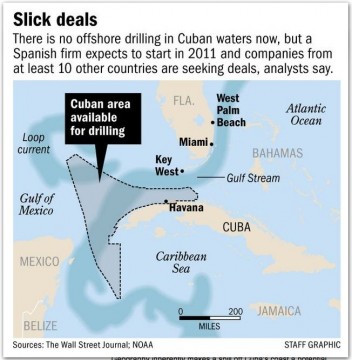Tropical storm, oil slick equal more fear, uncertainty By the CNN Wire Staff June 26, 2010 2:34 p.m. EDT New Orleans, Louisiana (CNN) — As much as 2.5 million gallons of oil could flow into the Gulf of Mexico for two weeks if Tropical Storm Alex forces a work stoppage at the ruptured BP well. Adm. Thad Allen, the government's disaster response manager, said Saturday that gale-force winds near the well head would prompt an evacuation of the thousands of workers and vessels involved in the oil recovery and cleanup effort. It would take 14 days to put everything back in place, Allen said. That means the containment cap would be off for that period, allowing oil to flow freely. Researchers have estimated that between 35,000 barrels — about 1.5 million gallons — and 60,000 barrels — about 2.5 million gallons — of oil are gushing into the ocean every day. Anxiety levels rose Saturday as Alex churned toward Mexico with a potential for hurricane force winds in the coming days. The storm is not on track to directly pass over oil-affected areas but forecasters have not ruled out an easterly shift in Alex's path. “We all know the weather is unpredictable, and we could have a sudden last-minute change,” Allen said. Alex — the first named storm of what is expected to be a fierce Atlantic hurricane season — formed in the Caribbean on Saturday and had maximum sustained winds of 45 mph. It was heading toward Belize and Mexico's Yucatan Peninsula. Allen said it would take five days to evacuate more than 38,000 people and 6,000 vessels that are involved in the oil response as well as the two rigs that are collecting about 24,500 barrels of oil a day from the well, Allen said. He told CNN there is “no playbook” when it comes to responding to a massive oil spill as a storm brews. “But I will tell you there's been an extraordinary amount of planning being done,” he said. BP plans to place a third rig called the Helix Producer at the well site next week, which will increase the amount of oil being captured to 53,000 barrels a day, Allen said. That, too, could be disrupted if Alex affects the area. Gulf Coast residents feared that high winds and storm surges could spread the slick and push more oil ashore into bays, estuaries and pristine beaches, exacerbating the oil disaster triggered by BP's ruptured well. “The greatest nightmare with this storm approaching is that it takes this oil on the surface of the Gulf and blows it over the barrier islands into the bays and the estuaries,” Sen. Bill Nelson, D-Florida, told CNN. “And that is where you really get the enormous destruction, because it's just very difficult to clean up those pristine bays.” Americans took to beaches Saturday to protest offshore oil drilling. They held hands and formed lines in the sand. “I believe Americans need to stand together and take our energy future back from the grip of the oil industry,” said Dave Rauschkolb, a restaurant owner from Seaside, Florida, who founded Hands Across the Sand. Deepwater drilling could resume by the end of July after U.S. District Judge Martin Feldman in New Orleans, Louisiana, on Thursday denied a request to keep a six-month moratorium imposed by President Barack Obama on May 27 in place, pending a government appeal. The government has 30 days to show it is beginning to comply with Feldman's order and start issuing permits. The appeals process can continue, but until the appeal, the government must act as if Feldman's order will be upheld. While protesters lined the sand, Alex moved toward Mexico, no one knowing whether it would make a sudden turn north into the open Gulf. Meteorologist Karen Maginnis said the “preferred scenario” actually would be for Alex to head to northern Florida. That's because the oil spill has been gradually rotating counterclockwise. If the storm heads to the east of it, it would send the oil farther out to sea. If the storm heads more directly towards the central Gulf and Louisiana, it might push the oil toward Florida. “We've never been in this situation before,” Maginnis said. “We've never seen an oil spill that encompassed the Gulf like this, end up so close to shore.” A powerful storm would also complicate efforts to clean up miles of coastline. “It's going to mean we're going to have to find a way to maneuver all our resources, change things,” said Grover Robinson, chairman of the Escambia County Commission in Pensacola, Florida. “We won't be able to fight the oil for a couple of days. And we have no idea about winds and current and what it will do to the oil in the gulf. So obviously, it's a very big concern for us.” Allen said he and some top Obama administration officials, including Vice President Joe Biden, will be headed back to the Gulf region next week to assess the oil relief efforts. But in a new blow to fishermen, Mississippi officials announced that waters east of the Gulfport shipping channel would be closed to shrimping, because of oil sighted in the area. In one Vietnamese fishing community in Biloxi, the oil spill has been devastating. Jennifer Le said her father has known nothing but shrimping since coming to America. He doesn't know how he would succeed in any other career and his checks from BP have not been enough. “I mean, everything was based on the waters and now it's just, it's just gone,” Le said. Aside from state closures, the federal government has banned fishing in 78,597 square miles of the Gulf, which is about 32.5 percent of of federal waters. Like Le, many oil-affected residents face an ominous future. But this week, there was some promising news for potentially tens of thousands of people seeking claims against BP. Kenneth Feinberg, who is administering the $20 billion compensation fund set up by BP under White House prodding, says that people who work in support of oil rigs will be able to file claims — and not just fishermen and businesses along the coast. Employees of businesses that brings tools to oil rigs, for example, also would be able to file a claim. The company previously agreed to set aside the $20 billion in an escrow account for spill-related costs, a sum that does not cover fees and penalties that could be imposed by the federal government. BP had resisted approving claims by people who said they were affected by the moratorium on oil drilling, saying it was imposed by the Obama administration. But Feinberg said BP and the administration now have agreed those claims will be covered. “I now have discovered — I didn't realize this until yesterday, but the moratorium claims will fall under my jurisdiction,” he told CNN. To date, almost 74,000 claims have been filed and more than 39,000 payments have been made, totaling almost $126 million, according to the company. CNN's Brandon Miller, T.J. Holmes and Moni Basu contributed to this report. added by: EthicalVegan
 Breaking Sports Video
Breaking Sports Video



























